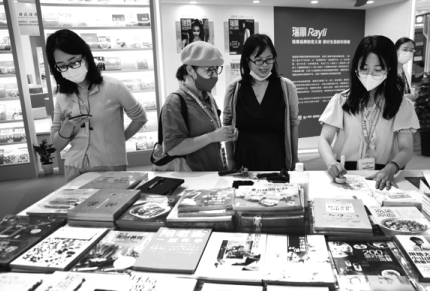Fair shows reading is page-turning success story

In a simple yet elegant bookstore, novelist Liu Zhenyun hosted a livestream, leading readers in touring world literature, a sideline session of the Beijing International Book Fair.
The 28th BIBF kicked off recently at the China International Exhibition Center in Beijing's Shunyi district. Hosting more than 2,200 exhibitors from 105 countries and regions and displaying some 300,000 books, it is the first major international book fair being held online and offline amid the COVID-19 pandemic.
People are increasingly embracing reading in China. Per capita, or per person, reading volume for paper books was 4.70 and 3.29 for digital books in 2020, with both figures higher than those in 2019, according to a national survey released in April by the Chinese Academy of Press and Publication.
A separate report conducted by consulting firm iResearch in cooperation with Chinese e-commerce giant JD says a significant proportion of people devoted more time to reading in 2020, as restrictions from COVID-19 caused people to spend more time at home. According to the report, more than 46 percent read more paper books, 59.6 percent read more digital books and 58.8 percent listened to more audiobooks.
Last September when Sinan Mansions reopened after more than 200 days of interruption due to the pandemic, hundreds of bookworms lined up at the door of the century-old redeveloped residential complex in Huangpu district, Shanghai, an area known to host literary greats.
Interest in the country's revolutionary history has also shot up, driven in part by the centenary of the founding of the Communist Party of China in July. Revolution-themed bookstores across the country have seen strong foot traffic since the beginning of this year.
Selected works of Mao Zedong are increasingly popular among readers born after 1985, shows big data from JD. Red Star Over China, authored by American journalist Edgar Snow in the 1930s about Chinese Communists, made it to the top-10 best-selling paper books list in 2020, according to the iResearch report.
Despite being veteran screen users, Generation Z people are showing more interest in physical books, says Shu Juan. Shu works at the domestic lifestyle hotel chain Atour, which is the first in Shanghai to introduce bookstores in their hotels. Compared to reading on mobile phones, Gen Zers are keen on meeting like-minded people at bookstores, says Shu, adding that reading also helps them fend off loneliness and anxiety.
In a recent city-wise survey, more than 65 percent of residents in Shanghai believe that reading can help alleviate anxiety.
According to Cai Xinyun, who is in charge of marketing at an outlet of the bookstore PageOne in Beijing, paper books still make up 65 percent of the turnover at the bookstore. Cai linked the booming sales with the growing ethos of reading in the country.
Statistics show that all provincial regions in China have developed their own signature reading programs, and more than 80 percent of counties and districts have local reading activities. China's brick-and-mortar bookstores are increasingly emphasizing the "reading experience".
"Bookstores now have an edge on spontaneity and interactivity," says Li Suwan, who runs a bookstore beside the Second Ring Road in downtown Beijing.
The bookstore hosts cultural activities every week, including performances, film screenings and reading salons.
"Shopping for books is not the most important thing here-the most important thing is reading. The exchange of ideas is equally important," says Li.
Under the onslaught of a booming e-commerce sector, physical bookstores in China have diversified into the arts, tourism and catering industries. Many of them have become landmark cultural complexes of their cities.
The relocated Bell Tower Bookstore in Xi'an, Northwest China's Shaanxi province, retains its facade style from decades ago, helping readers and visitors experience the city's history as an ancient Chinese capital.
Despite the impact of COVID-19, China added another 4,061 physical bookstores in 2020, according to an industry report released at a bookstore conference in March.
Xinhua


Today's Top News
- China to apply lower import tariff rates to unleash market potential
- China proves to be active and reliable mediator
- Three-party talks help to restore peace
- Huangyan coral reefs healthy, says report
- PLA conducts major drill near Taiwan
- Washington should realize its interference in Taiwan question is a recipe it won't want to eat: China Daily editorial






























